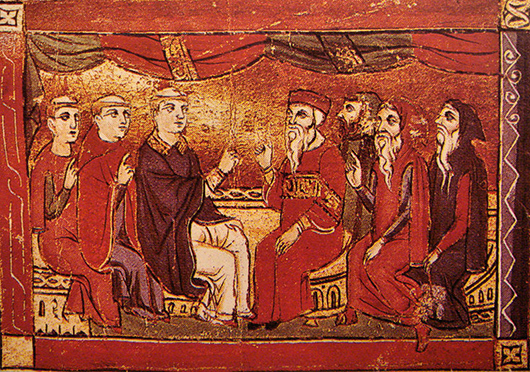For the past few years, Zach and I have had a running debate with Vlad about whether the term “Ecumenical” aptly describes Morning Walk. Zach and I advocate for its inclusion into our Mission Statement. Vlad, in all his belligerent Russian Orthodox fashion, thinks the word speaks too much like a festering of High Church Anglicans getting together with Vatican higher-ups to dither about much of nothing and sign something that has little real world implications. Such “Ecumenism” does not reflect the spirit of true Christian ecumenical conversation, and Vlad is right to be concerned with the usage of a word that has become so distorted. Whether or not “Ecumenical” should be a term used to officially describe Morning Walk, I want to discuss what good Ecumenism looks like.
Lexico defines “ecumenical” as either “representing a number of different Christian Churches” or “promoting or relating to unity among the world’s Christian Churches.” These definitions are as vague as they are unhelpful for our purpose of defining real Ecumenism. In my mind, and heart really, I imagine good Ecumenism to look like those debates in which Bishops were locked together, given only bread and water for days till agreement (or tolerable disagreement more likely) could be reached.
Debates between Bishops and conversations between Apostolics and Protestants are of a different sort. I have no input or qualification to be part of a Church council. All I am able to do is represent the teaching of the Church to others. Only on those issues left as a mystery by the Church do I address my own opinions on matters. The spirit that surrounds vigorously scrutinizing one another’s views, sharpening these views, and seeking the truth as a result, is a form of Ecumenism very much worth engaging in.
What I push strongly against is what I will term “Soft” Ecumenism. This is an Ecumenism where issues of debate are addressed in a meaningless way and the primary focus is unity at all costs. Generally this is the sentiment of bringing all parts of the Christian tree together in a wonderful kumbaya circle. While unity of the Church is something that is worthwhile, it is a unity that must be earned through discussion, debate and interaction among Christians. Soft Ecumenism cheapens unity by replacing it with good feelings and ignoring the significance of the issues at hand.
Real Ecumenism deals with the issues at hand in a healthy way. An analogy of Ecumenism as a relationship could illuminate my point. In a relationship between close friends, family, and spouses, some level of healthy conflict management is necessary to keep the relationship strong. People disagree, but there is an objective truth at the heart of most disagreements. Through conflict people can bring themselves closer to that truth, so long as they are open to conflict in a healthy way. A husband and wife that never talk to each other about big issues in order to avoid conflict, can lead to a lackluster marriage with little communication and growth. On the other hand, a couple that always fights and never listens makes way for dysfunctional relationship dynamics. Disagreeing and understanding the reasons for disagreement sharpens one’s viewpoint and helps bring two people to truth. This is not to compare the relationships between Christian groups to that of marriage, but more to illustrate the benefits that come with frequent and open communication between people seeking truth (which necessarily involves conflict).
Obviously imbalance exists when we move from individual to Church. Vlad makes a good point when he writes that, on many issues of doctrine, Apostolics have settled these issues over a millennium ago. This point is well taken, as on Apostolic succession, Sacraments, and ecclesiology, these issues are settled for us. However there is still room for nuance and mystery. Some issues have no clear Church teaching, or the Church has intentionally left it vague. Take Predestination: while the Church teaches that Free Will Exists and that God has Predestined us, how we understand that to work is left up to debate. I could take the most hardline of Thomist stances or the more airy Molinist position. Predestination is not the only issue where the Church allows a healthy debate; Covenant Theology, Theology of the Body, Ecclesial Theology, and many other areas can be honestly discussed and debated without an answer hiding in the back of one’s mind.
For both Orthodox and Catholic Christians, we are called to deep relations with one another. I know this is controversial to say, but the disagreements that separate Catholics and Orthodox Christians theologically today are nothing compared to the theological debates and disagreements of the early Church. Yet the early Church (I am speaking to Apostolics here) was unified between the East and West under the Patriarchs. Ecumenism, at its best, means we continue to disagree fervently, seeking the truth through impassioned discussion and debate while seeking unity on a sacramental level. While the term has been hijacked of late, I do not think it is beyond saving.
This article is part of a series of articles where I look to expand on my research concerning Catholic-Orthodox relations. In this series I write on both what I have learned from reading Orthodox priests and theologians and what I think Catholicism can offer in return. Other articles:
The Dangers of Systematic Theology
A Manual for Catholics on How to Dialogue with Orthodox Christians


Leave a Reply